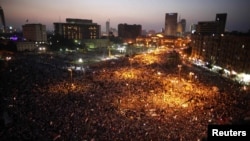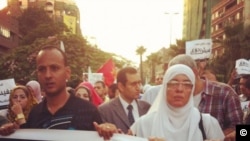CAIRO - Early last year, the powerful images of millions of Egyptians flooding Tahrir Square became a symbol embraced by the world as ground zero of Arab self-determination.
Sure, Tunisia was the Arab Spring's first revolution to depose a dictator. Bahrain, Yemen and Syria have had their own uprisings, still largely unresolved.
But Egypt’s Tahrir Square was seen as the icon. To many, it represented and continues to represent the essence of a do-or-die standoff between people and their unwanted leaders.
In the case of Egypt, largely peaceful demonstrations fueled by Facebook, Twitter and international media coverage led to the ouster of strongarm president Hosni Mubarak. The resulting vacuum brought to power a military council promising a swift restoration of civilian rule. That was 16 months ago and for 16 months the people were patient. Tahrir, too, the symbol of idealism which once mobilized an entire nation, has been relatively quiet. Protests against the slow pace of transition were small. The level of political apathy seemed to be palpably growing.
But all that seems to be changing again.
Within the past week, Egypt’s military rulers, the Supreme Council of the Armed Forces (SCAF) introduced security measures reminiscent of Mubarak’s decades-old Emergency Laws that allowed the army and intelligence services to detain dissenters practically without charge.
The Supreme Constitutional Court ruled the Muslim Brotherhood-dominated parliament unconstitutional after recent elections and dissolved it in its entirety. Also, the SCAF issued an 11th hour decree granting itself legislative and budgetary powers in the absence of a parliament.
And all this happened against the backdrop of the first free presidential elections the country has seen, and most likely because of them. The results of the poll, although vote counting continues, seem to indicate that here, too, the Muslim Brotherhood, for decades a political pariah, would come out on top. According to early results, the group's candidate, Mohamed Morsi, is ahead of Ahmed Shafiq, Mubarak's last prime minister and widely considered the man with whom the country's generals would find it easier to collude.
The way many Egyptians had been feeling until recently about Tahrir was probably best put in an activist's tweet:
“Tahrir doesn’t represent Egypt anymore! It's more like a theater being rented by different actors everyday & Egyptians r just watching.”
Even each day this week, a different contingent seemed to take to the square, and usually only hundreds appeared. At one point even members of the dissolved parliament attempted in vain to conduct a session in Tahrir as they were prohibited by the SCAF from entering the building of the Legislative Assembly.
To supporters of Morsi, Tahrir was the venue for early presidential victory celebration for a Muslim Brother they hope will ascend the land's highest office. But many view these celebrations as premature at best.
Morsi, if actually victorious, has been stripped of most powers by the SCAF. Also, Shafiq has not conceded the race. With events shifting at a rapid pace, a mentality has developed to "celebrate while you can" because rules may again change.
Indeed, while covering this story in Cairo for the past six days, Tahrir seemed like a common green any political group could rent for free.
The graffiti around the square, too, painted a disturbing picture. Symbols of January 25 martyrs and anti-Mubarak slogans from the revolution's early days have been replaced by more cynical murals of the SCAF pulling the strings of dancing skeletons.
“I don’t think people misjudged the intentions of the SCAF,” said Ashraf Khalil, author of Liberation Square, a journalist’s account of the January 25 revolution. “They misjudged the true strength of the establishment here and how quickly things could shift.”
Khalil said it is possible that even during apex of the January 25 revolution and the months that followed, Egypt remained as fractious as ever but the focus on Mubarak concealed the fault lines.
“I think this fragmentation we’re seeing could be an indication of real Egyptian society. When a Mubarak is removed, all these fault lines come to the forefront. And it doesn’t necessarily need to be a bad thing. If anything, it would have been more healthy if the way this presidential election was going was working along some of these new fault lines. Instead, we’re reverting to the old fault lines. We’re reverting to the security establishment versus Muslim Brotherhood. It’s the failure to overcome these things, these old networks.”
The existence of Mubarak and the push for his removal was the focal point of Tahrir in 2011. It propelled hundreds of thousands to take to the square. But Mubarak was only the figurehead of an entrenched military establishment led by the SCAF. Egyptians, some say, appear to be awakening to that fact now.
Tonight, on my seventh day, many Egyptians are returning to the place that brought them together last year. As of this writing, about 70,000 people have descended on Tahrir. They represent the Muslim Brotherhood’s Freedom and Justice Party, the conservative An-Nour party, the Revolutionary Youth Coalition and the April 6 Movement. They are indignant, deafening and unified.
Perhaps it took some time for Egyptians to realize what the international press had already assessed - that they had witnessed a soft military coup and were being cheated out of the democracy they fought so hard for.
If tonight is any indication, Egypt will not go quietly...
Sure, Tunisia was the Arab Spring's first revolution to depose a dictator. Bahrain, Yemen and Syria have had their own uprisings, still largely unresolved.
But Egypt’s Tahrir Square was seen as the icon. To many, it represented and continues to represent the essence of a do-or-die standoff between people and their unwanted leaders.
In the case of Egypt, largely peaceful demonstrations fueled by Facebook, Twitter and international media coverage led to the ouster of strongarm president Hosni Mubarak. The resulting vacuum brought to power a military council promising a swift restoration of civilian rule. That was 16 months ago and for 16 months the people were patient. Tahrir, too, the symbol of idealism which once mobilized an entire nation, has been relatively quiet. Protests against the slow pace of transition were small. The level of political apathy seemed to be palpably growing.
But all that seems to be changing again.
Within the past week, Egypt’s military rulers, the Supreme Council of the Armed Forces (SCAF) introduced security measures reminiscent of Mubarak’s decades-old Emergency Laws that allowed the army and intelligence services to detain dissenters practically without charge.
The Supreme Constitutional Court ruled the Muslim Brotherhood-dominated parliament unconstitutional after recent elections and dissolved it in its entirety. Also, the SCAF issued an 11th hour decree granting itself legislative and budgetary powers in the absence of a parliament.
And all this happened against the backdrop of the first free presidential elections the country has seen, and most likely because of them. The results of the poll, although vote counting continues, seem to indicate that here, too, the Muslim Brotherhood, for decades a political pariah, would come out on top. According to early results, the group's candidate, Mohamed Morsi, is ahead of Ahmed Shafiq, Mubarak's last prime minister and widely considered the man with whom the country's generals would find it easier to collude.
The way many Egyptians had been feeling until recently about Tahrir was probably best put in an activist's tweet:
“Tahrir doesn’t represent Egypt anymore! It's more like a theater being rented by different actors everyday & Egyptians r just watching.”
Even each day this week, a different contingent seemed to take to the square, and usually only hundreds appeared. At one point even members of the dissolved parliament attempted in vain to conduct a session in Tahrir as they were prohibited by the SCAF from entering the building of the Legislative Assembly.
To supporters of Morsi, Tahrir was the venue for early presidential victory celebration for a Muslim Brother they hope will ascend the land's highest office. But many view these celebrations as premature at best.
Morsi, if actually victorious, has been stripped of most powers by the SCAF. Also, Shafiq has not conceded the race. With events shifting at a rapid pace, a mentality has developed to "celebrate while you can" because rules may again change.
Indeed, while covering this story in Cairo for the past six days, Tahrir seemed like a common green any political group could rent for free.
The graffiti around the square, too, painted a disturbing picture. Symbols of January 25 martyrs and anti-Mubarak slogans from the revolution's early days have been replaced by more cynical murals of the SCAF pulling the strings of dancing skeletons.
“I don’t think people misjudged the intentions of the SCAF,” said Ashraf Khalil, author of Liberation Square, a journalist’s account of the January 25 revolution. “They misjudged the true strength of the establishment here and how quickly things could shift.”
Khalil said it is possible that even during apex of the January 25 revolution and the months that followed, Egypt remained as fractious as ever but the focus on Mubarak concealed the fault lines.
“I think this fragmentation we’re seeing could be an indication of real Egyptian society. When a Mubarak is removed, all these fault lines come to the forefront. And it doesn’t necessarily need to be a bad thing. If anything, it would have been more healthy if the way this presidential election was going was working along some of these new fault lines. Instead, we’re reverting to the old fault lines. We’re reverting to the security establishment versus Muslim Brotherhood. It’s the failure to overcome these things, these old networks.”
The existence of Mubarak and the push for his removal was the focal point of Tahrir in 2011. It propelled hundreds of thousands to take to the square. But Mubarak was only the figurehead of an entrenched military establishment led by the SCAF. Egyptians, some say, appear to be awakening to that fact now.
Tonight, on my seventh day, many Egyptians are returning to the place that brought them together last year. As of this writing, about 70,000 people have descended on Tahrir. They represent the Muslim Brotherhood’s Freedom and Justice Party, the conservative An-Nour party, the Revolutionary Youth Coalition and the April 6 Movement. They are indignant, deafening and unified.
Perhaps it took some time for Egyptians to realize what the international press had already assessed - that they had witnessed a soft military coup and were being cheated out of the democracy they fought so hard for.
If tonight is any indication, Egypt will not go quietly...





